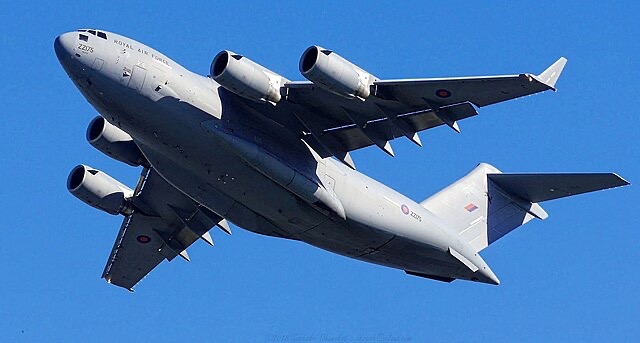RAF to carry atomic bombs for first time since Cold War as PM caves to White House pressure with dozen F-35A jets that cost £60m EACH
Sir Keir Starmer has ordered a dozen nuclear-capable F-35A fighter jets from the US in a dramatic £700 million splurge – just days after Donald Trump blasted NATO allies for not spending enough on defence.
The Prime Minister will today tell NATO leaders in The Hague that Britain is buying the atomic bomb-carrying warplanes in what officials are calling the “biggest strengthening of the UK’s nuclear posture in a generation.”
It marks the first time since the Cold War ended that the Royal Air Force will be able to drop nuclear weapons – a capability Britain gave up in 1998 when it retired its last air-launched atomic bombs.
Trump gets his way
The eye-watering purchase comes after President Trump repeatedly hammered NATO members for failing to meet defence spending targets, even threatening to abandon countries that don’t pay their “fair share.
At around £60 million per jet for the latest production models, the dozen F-35As will set British taxpayers back an estimated £700 million – though some sources suggest the total bill could reach nearly £1 billion.
Starmer will tell the summit: “The UK’s commitment to NATO is unquestionable, as is the alliance’s contribution to keeping the UK safe and secure. But we must all step up to protect the Euro-Atlantic area for generations to come.”
Nuclear bombs from America
The fifth-generation stealth fighters, built by US defence giant Lockheed Martin, are among the most advanced warplanes on the planet – and also the priciest.
Crucially, the F-35A variant can carry American B61 tactical nuclear bombs, which would need to be supplied by the United States for use on the British jets.
One defence official, speaking anonymously, confirmed: “Britain would likely need the United States to supply those weapons for use on the planes.”
RAF’s atomic comeback
The purchase represents a major victory for the Royal Air Force, which has lobbied for years to regain its nuclear strike capability.
Britain’s last air-dropped nuclear weapon, the WE-177 free fall bomb, was withdrawn from service in 1998 as part of the “peace dividend” following the Soviet Union’s collapse.
Since then, the UK’s nuclear deterrent has relied entirely on the Royal Navy’s four Vanguard-class submarines armed with Trident missiles – a system that embarrassingly misfired during tests last year.
‘Radical uncertainty’
In an era of radical uncertainty we can no longer take peace for granted,” Starmer declared, justifying the massive expenditure.
The jets will be based at RAF Marham in Norfolk alongside Britain’s existing fleet of F-35B variants, which cannot carry nuclear weapons.
NATO Secretary-General Mark Rutte welcomed the announcement, calling it “yet another robust British contribution to NATO.
Jobs boost claim
Downing Street insisted the purchase would support 20,000 British jobs, with 15% of the global F-35 supply chain based in the UK.
The government also claimed that buying the F-35A variant instead of more F-35Bs would save up to 25% per aircraft – though critics questioned why such expensive jets were needed at all.
Britain is expected to purchase 138 F-35s in total over the lifetime of the programme, with this dozen representing just the latest tranche.
Putin on notice
The move sends a clear signal to Vladimir Putin that Britain is serious about deterrence, as NATO members prepare to increase defence spending to 5% of GDP by 2035 – up from the current 2% target.
Defence Secretary John Healey said: “The Strategic Defence Review confirmed we face new nuclear risks, with other states increasing, modernising and diversifying their nuclear arsenals.
He added: “This commitment is an embodiment of NATO first, strengthening the alliance while at the same time using defence as an engine for growth to create jobs across the UK.”
Timeline unclear
The full details of the deal with Washington remain murky, with no clear timeline for when the jets will be delivered or when they might become operational.
Britain would also need formal agreements with the US to access B61 nuclear bombs, which would remain under American control even when deployed on RAF aircraft.
The last US nuclear weapons left British soil in 2008, when the threat of major conflict seemed to be receding.
Trident troubles
The decision to diversify Britain’s nuclear capabilities comes after repeated failures of the submarine-based Trident system.
A test launch went awry last year – the second successive failure after a missile veered off course in 2016, raising questions about the reliability of Britain’s sea-based deterrent.
By adding air-launched nuclear weapons to its arsenal, Britain would align more closely with NATO allies like France and the United States, which maintain land, sea, and air-based nuclear capabilities.
The F-35As will allow Britain to participate in NATO’s nuclear-sharing arrangements for the first time, though the final decision on any nuclear strike would require approval from both the British Prime Minister and the US President.
Royal Air Force C‑17 Globemaster III parked at a Middle East base (RAF 901 Expeditionary Air Wing, B Flight)
Photo by Sergeant Ross Tilly, RAF, taken on 4 August 2011 at 17:39, used under Crown Copyright, with reuse permitted as labeled on Wikimedia Commons



